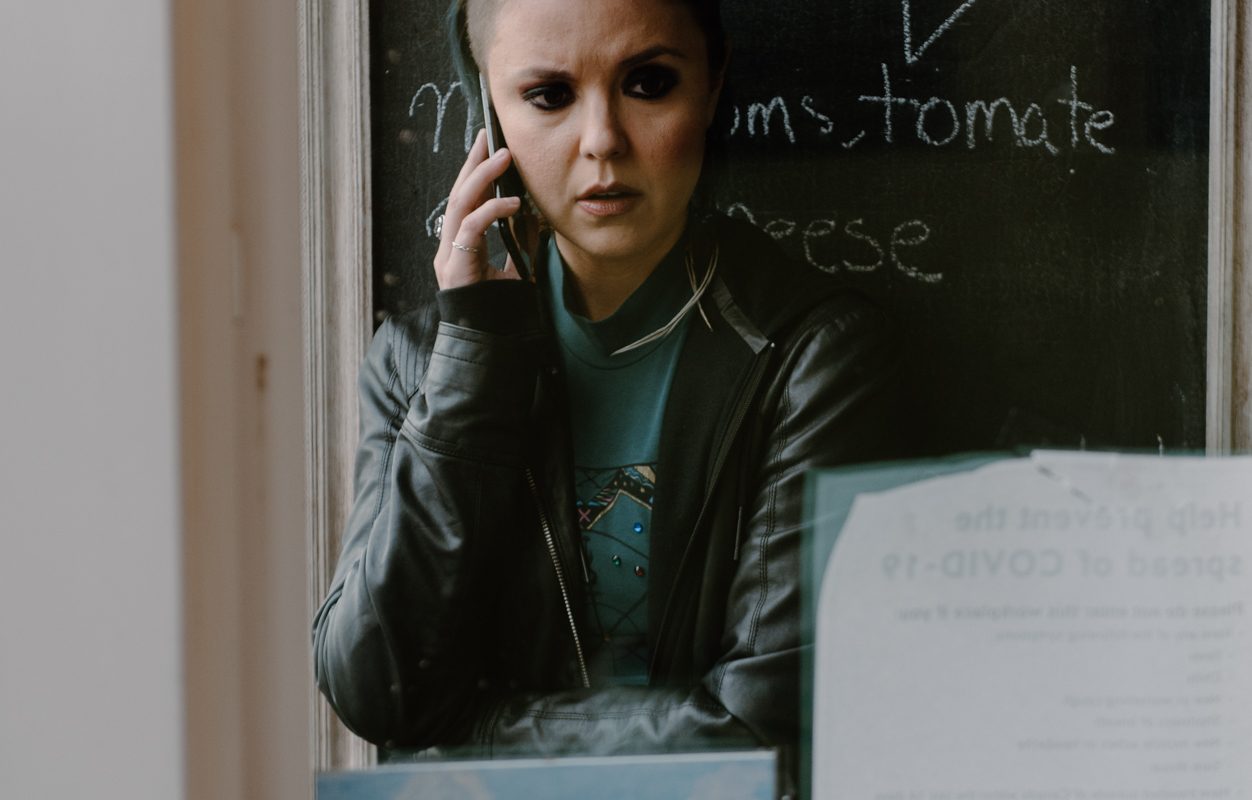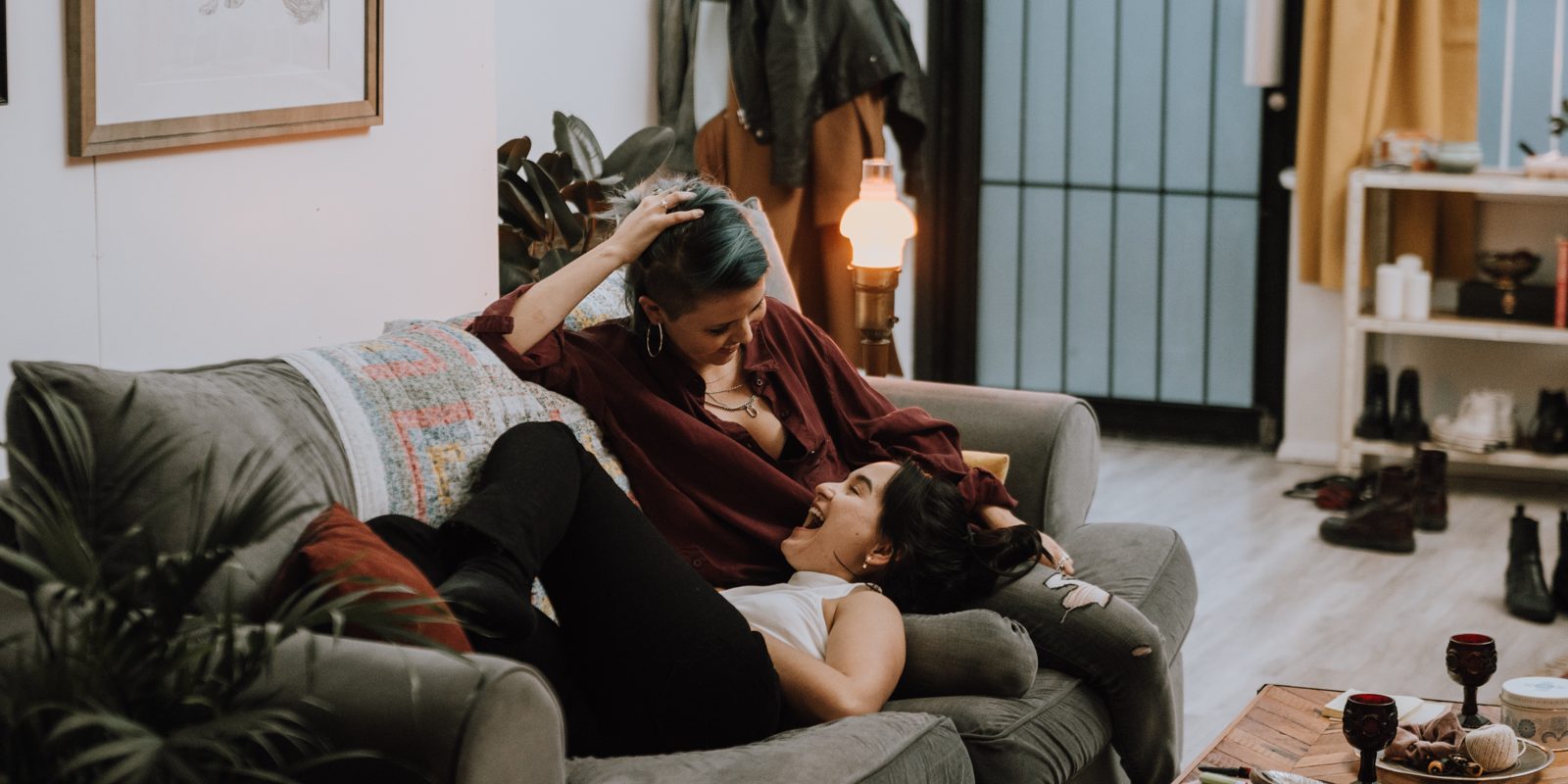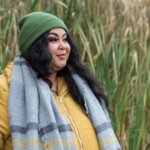Imagine you’re a young Indigiqueer or Two-Spirit youth growing up in a colonial world. You’re flipping through channels looking for something fun to watch. You want to see a storyline that you can connect with, but all the queer characters are white and never say more than not-so-funny supposedly gay quips. Finally, you turn off the TV and decide you’re going to check out the Aboriginal Peoples Television Network (APTN) website; they always have something funny to watch. You don’t expect to find anything queer, but at least the people will look like you. And then there it is, an ad for a new show called Querencia, “a coming of age 2SLGBTQ+ web series that centres on the budding romance between two young Indigenous women.” You can’t believe what you’re reading: an actual show about everyday queer people who sound just like your friend group, or the friend group you hope to have one day. You click on the link and are immediately transported to a story that feels like home.
Querencia is a contemporary story of two Indigiqueer women trying to find themselves in a colonial world. Navigating culture, community and trauma, the story of star-crossed lovers thrusts viewers into relatable plotlines, from chasing dreams to learning to heal, as the two lead characters Daka (Kaitlyn Yott) and Abe (writer and director Mary Galloway) fall in love with each other and themselves.
Galloway, who has written, directed and acted in various shorts and TV episodes, created Querencia exactly for the reason I got caught up in it: to provide representation for Indigiqueer and Two-Spirit people. Xtra recently caught up with Galloway, who is based in Vancouver, to discuss what it was like telling such an important story and sharing it on an Indigenous platform.
So tell us about yourself. Who is Mary Galloway?
I am from the Coast Salish territory, a member of the Cowichan Tribe, as well as mixed settler descent. I am an Indigiqueer cis female, writer, director, actor and producer when I have to be, and I am, in general, a storyteller. I love to tell stories that represent my communities and my people and the voices of women, gender diverse people and the BIPOC community.
What got you into writing and creating?
That’s a great question. When I first started in the film industry, I was a through-and-through actor—I had never written or directed or produced a day in my life. I did a two-year full-time intensive acting program at [Vancouver’s] New Image College of Fine Arts. While I was there, I learned from some incredible teachers who became lifelong mentors, like Patrick Sabongui. In my final year-end project, we decided as a class to write a school play. Instead of picking a play and trying to squeeze all our students into roles that weren’t necessarily right for them, we wanted to write and showcase our acting in a way that we hoped to be cast upon graduation. I fell in love with having the creative juices to be able make something out of nothing.
“Well, I kinda know how to write already, what if I write myself a role?”
When I graduated from acting school, I was ready to act and so I thought, “World I’m ready to act, where are the good roles?” And there was nothing. I was getting auditions for like “sad girl #1” or “sexy college girl #2,” not interesting, dynamic or diverse characters. So then I thought, “Well, I kinda know how to write already, what if I write myself a role?” I sat down and wrote my first short film called Ariel Unraveling, and I went and pitched it with Patrick to a live audience at a film festival pitch competition. I enlisted Patrick as my mentor and producing partner for that film. I didn’t direct that one, so I decided next time around that I should direct. So then I started directing as much as writing as much as acting. Now it’s sort of a three-way tie between writing, directing and acting that I am pursuing equally, and loving for different reasons. That’s sort of how I got into the behind-the-camera stuff.
That’s amazing. We love a triple threat! So alongside Jessie Anthony, you won the pitch contest to make an APTN ImagiNative web series that resulted in Querencia. What was that like for you?
Yah, the pitch competition—the world’s largest Indigenous pitch competition, in front of 200 industry executives in a theatre in Toronto, TIFF Lightbox, as well as movie lovers in the audience. It was terrifying and exhilarating. Jessie and I worked our butts off to get the pitch just right. We stayed up late and practiced and practiced, and wrote and scrapped. And we decided in the end to just forget about the whole script, we knew what we wanted to say—let’s just get up on that stage—and we basically winged it. We trusted it would come back to us and it did, and we won that pitch competition in 2019. It was like a whirlwind.
“She is very clear, very connected to the LGBTQ2S+ community, but not connected to her Indigeneity.”
We had originally pitched the show to be only four episodes, each five minutes in length, so that’s 20 minutes of content. After we got the pitch competition award, we saw Telefilm Canada was in their final year of funding web series. We thought, “we better apply, it’s our last chance to make a series with Telefilm.” So we applied to the Canadian Film Academy, and they chose us as their Indigenous team to submit to Telefilm. We applied and we got that funding—and then the pandemic hit. So I rewrote the entire series, from the 20 minutes of content, to 80 minutes of content. This was because, with Telefilm, the most money you could ask for was for 80 minutes of content, and we thought: Let’s go big or go home. So we scraped the first four episodes, started from scratch and made a whole 80 minute arc for this season. And then the rest is history.

Credit: Veronica Bonderud
This show is a coming-of-age story. Can you talk about the plot?
Querencia is about two Indigiqueer women from very divergent paths and backgrounds: we have Daka, who is traditional, a very kind of closeted and kind of dark person with a, gentle demeanour. Daka has a dream of becoming a professional dancer in the big city of Vancouver. And then we have Abe [played by Galloway herself], who is the opposite of Daka. She is kind of a hot mess: she is out and proud, she is a musician, she is very clear, very connected to the LGBTQ2S+ community, but not connected to her Indigeneity. So the story follows the two girls as they meet by happenstance and they fall in love. They kind of navigate each other’s world that they each know nothing about.
How important was it for you to include Indigenous elements in this show?
It was so important for me that I was giving a voice to the Indigenous community in an authentic and real way. So right off the top, my producer who came on board, Jessie Anthony, she has a 100 percent Indigenous-owned production company. And she got a grant from the Indigenous screen office to mentor an up-and-coming Indigenous producer. So all of the producing team, as well as myself as an executive producer, are Indigenous. Then for casting, we mandated that we needed an Indigenous queer female actor for the leading role of Daka. That was not something I was willing to budge on. There aren’t a lot of Indigiqueer trained actors out there, so we had the least amount of submissions for that role. There were Indigenous people [who auditioned], but they weren’t queer. But from behind the lens to in front of it, we had authentic Indigenous representation, through and through. And that’s something that, in telling Indigenous stories, it is mandatory. It is not optional.
“You gotta make space for yourself, push in the door if it’s not opening for you, get yourself in one way or the other.”
If someone is going to tell an Indigenous story, we need Indigenous people to be able to tell the story authentically; they need to be given opportunities. And I think that the end result is that, hopefully, the Indigenous community will feel seen and heard, and know that they matter and that they will see themselves reflected on screen. I think it’s so important. It’s just a ripple effect, you know? If you see yourself on the screen, then you think that you do belong in this world and that there are other people out there, that you are not alone. I think that it’s just absolutely necessary.
I guess that leads me into my next question: Why was Querencia being picked up by APTN so important?
APTN has been a champion of this show since day one. I think they understand the importance of Indigiqueer stories being told, and they really value and respect my creative eye and my creative decisions. Never once have I been challenged on being the writer, director and lead actor. They’re like, “Go for it, get it, you got this!” And having a network that just puts their trust in an emerging filmmaker like myself, it’s really an incredible thing. I think that they are starting to branch out and to reach further with their content and with their audience. APTN has been the path maker for so many years. I’m just so grateful to be on their network; I’ve always wanted to work with them.
So what do you want viewers to take from Querencia?
I think it’s really a dream of mine for people to take away from Querencia this feeling of belonging, of feeling like they matter. And for people, especially the Indigenous community and the queer community, to have something to turn to and watch and feel comforted by. You know, there are hard times for sure in this series, there are challenges—it’s not all rainbows and lollipops—but for the community to see themselves thrive.
What advice would you give to young Indigiqueer folks who want to get into film, whether it be writing, directing or acting?
I have so much advice. I would say my first piece of advice to Indigiqueer youth who want to get involved in filmmaking would be to study, to learn. It doesn’t have to be through school. You can be self-taught—there are lots of resources online. Get books from the library, you don’t even need to buy them. Educate yourself. Get a mentor as early as you can that you can look to for advice. Ideally a BIPOC mentor who understands what it means to be BIPOC in this world, in this day and age. Work your ass off, because you need to show and demonstrate to the powers that be that it is worth investing in you, taking a risk on you. There’s a lot of old school mentality, that folks would rather go the safe route and go with someone who is further ahead than you. You gotta make space for yourself, push in the door if it’s not opening for you, get yourself in one way or the other, but make sure you’re prepared when you get there. You gotta be good at what you do. You can’t just sit back and twiddle your thumbs and hope that things will come to you. You gotta work hard and prepare yourself for when that door opens. And believe in yourself, you have to believe in yourself. Be bold. Be brave. Be vulnerable.
The eight-part webseries is streaming on APTN’s Lumi platform.


 Why you can trust Xtra
Why you can trust Xtra


